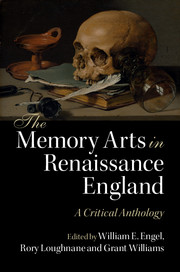Book contents
- Frontmatter
- Dedication
- Contents
- List of figures
- Acknowledgements
- A note on abbreviations
- Introduction
- PART I The art of memory
- PART II Rhetoric and poetics
- PART III Education and science
- Introduction to Part III
- III.1 Thomas Elyot, The Governor (1531)
- III.2 Roger Ascham, The Schoolmaster (1570)
- III.3 Levinus Lemnius, The Touchstone of Complexions (1576)
- III.4 William Kempe, The Education of Children (1588)
- III.5 John Brinsley, Ludus literarius (1612)
- III.6 Robert Burton, The Anatomy of Melancholy (1621)
- III.7 Thomas Sprat, The History of the Royal Society (1667)
- III.8 John Wilkins, An Essay towards a Real Character (1668)
- III.9 Obadiah Walker, Of Education (1673)
- III.10 Robert Hooke, ‘An Hypothetical Explication of Memory’ (1682)
- PART IV History and philosophy
- PART V Religion and devotion
- PART VI Literature
- Index
- References
III.2 - Roger Ascham, The Schoolmaster (1570)
from PART III - Education and science
Published online by Cambridge University Press: 05 August 2016
- Frontmatter
- Dedication
- Contents
- List of figures
- Acknowledgements
- A note on abbreviations
- Introduction
- PART I The art of memory
- PART II Rhetoric and poetics
- PART III Education and science
- Introduction to Part III
- III.1 Thomas Elyot, The Governor (1531)
- III.2 Roger Ascham, The Schoolmaster (1570)
- III.3 Levinus Lemnius, The Touchstone of Complexions (1576)
- III.4 William Kempe, The Education of Children (1588)
- III.5 John Brinsley, Ludus literarius (1612)
- III.6 Robert Burton, The Anatomy of Melancholy (1621)
- III.7 Thomas Sprat, The History of the Royal Society (1667)
- III.8 John Wilkins, An Essay towards a Real Character (1668)
- III.9 Obadiah Walker, Of Education (1673)
- III.10 Robert Hooke, ‘An Hypothetical Explication of Memory’ (1682)
- PART IV History and philosophy
- PART V Religion and devotion
- PART VI Literature
- Index
- References
Summary
About the author
Roger Ascham (1515–68) pursued various court and university appointments from a strong humanist perspective. In his tutoring of princess Elizabeth, he employed the method of double translation, which he popularised. Eventually he became Mary I's Latin Secretary, holding the position into Elizabeth's reign and until his death.
About the text
Published posthumously, this treatise is the most famous of Ascham's writings and one of the foundational works of English education, although Ascham, a tutor only, never taught in a grammar school. It is divided into two books, the first of which describes the nature and habits of the ideal teacher and student. Because sound judgement and virtuous behaviour arise from proper learning, and proper learning, in turn, depends upon cultivating an eloquent, rather than a barbarous, tongue, the second book – most likely incomplete – explains the pedagogical technique of double translation, whereby students translate classical exemplars into English and then back into Latin. The following excerpt comes from a general discussion of what qualities constitute a teachable wit, raising the issue of flogging, whose ineffectuality yet popularity as a teaching strategy apparently inspired Ascham to write his book.
The arts of memory
In Ascham's text, the memory arts not only shape curricular matters such as the humanist project of reviving the classical past and its wisdom through learning Greek and Latin but also influence the psychology of pedagogy – the examination of the scholar's wits most famously explored by Juan Huarte in 1575. Ascham argues that schoolmasters do not know how to identify the best minds among students. They favour quick wits instead of hard ones, failing to realise that quick wits are quick to forget, while hard wits, like inscriptions made in stone, which require effort, retain things the longest. Ascham's logic operates according to the fundamental Aristotelian distinction between the hard and soft mind. The excerpt conforms to similar reasoning in observing that the youthful mind is impressionable like the newest wax, another classical trope for memory storage. As a result, young students are most receptive to the love of learning and do not need to be beaten to retain their lessons, such trauma inducing forgetting.
Textual notes
Roger Ascham, The scholemaster or plaine and perfite way of teachyng children, to vnderstand, write, and speake, the Latin tong (London, 1570), E2v–E3r.
- Type
- Chapter
- Information
- The Memory Arts in Renaissance EnglandA Critical Anthology, pp. 153 - 155Publisher: Cambridge University PressPrint publication year: 2016



